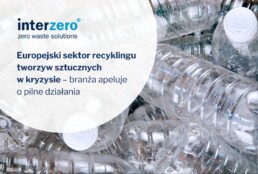
European plastics recycling sector in crisis - industry calls for urgent action
The European plastics recycling industry is on the brink of collapse, alarms Plastics Recyclers Europe. Declining competitiveness, rising energy costs, low prices for imported raw material and significant administrative burdens are causing more facilities to reduce or even close down production. This situation threatens not only the plastics recycling industry itself. The lack of local raw material puts the EU's ambitious targets for a circular economy into question.
The scale of the crisis in the plastic recycling industry - production declines and a wave of closures
The latest figures on the state of the European plastics recycling industry are not encouraging. Representatives of Plastics Recyclers Europe speak plainly about the deep crisiswhich could even lead to the collapse of the entire industry.
- In 2023, there is an 8.3% decrease in the volume of plastics production.
- Between 2006 and 2023 the European industry's share of the global plastics processing market fell from 22% to just 12%.
- According to forecasts, by the end of 2025 alone, plastics recycling plants with a total capacity of almost 1 million tonnes will have disappeared from the old continent.
- In H1 2025 alone, plant capacity fell by almost as much as in the whole of 2024.
- Chemical recycling scale grows slower than expected, which could jeopardise the goal of chemical recycling 3 million tonnes of plastics by 2030.
The countries that have hitherto been European leaders in plastic recycling, i.e. the Netherlands, Germany and the UK, are most affected by the crisis. Analysts forecast that Plastic recycling industry to close 2025 with zero growth. Such an abrupt deceleration calls into question the further possibilities of developing a local circular economy.
See also: Commission gives green light to chemically recycled materials >>
European industry bowing to pressure from imported recyclate
Plastics Recyclers Europe sees the reasons for the growing crisis mainly in the lack of mechanisms to protect the domestic market from an influx of cheaper imported recyclate. Also of significance are steadily rising operating costs (e.g. the cost of purchasing green energy), high raw material prices and excessive bureaucracy, which makes it difficult, for example, to obtain and renew permits. All these factors make locally produced recyclate is significantly more expensive than imported recyclatewhose quality sometimes raises serious concerns.
As it turns out, the obstacles to building a competitive European plastics industry are also regulatory uncertainty and regulatory fragmentation across Member States. This is mainly about the EPR regulations, under which each Member State has created its own separate and different system. Plastics Recyclers Europe also draws attention to the insufficient enforcement of these EPR requirements under Community legislation.
Market and legislative uncertainty is a barrier to investment in new plastics recycling plants and technologies. In mid-September 2025, the US company will ExxonMobil announces investment halt in the chemical recycling centres being set up in Antwerp and Rotterdam, which were expected to collectively process up to 80,000 tonnes of waste per year. EU policy, which, according to ExxonMobil senior vice-president Jack Williams, discriminates against the use of existing petrochemical plants over stand-alone recycling facilities, was cited as the main reason.
Joint industry appeal to EU decision-makers
Faced with a catastrophic situation in the industry, representatives of the 28 largest players in the European plastics value chain have launched an appeal to EU decision-makers, urging them to take immediate action. In a joint letter, the recycling industry outlined 6 demands to address the sector's most pressing problems.
- Implement effective mechanisms to protect the market from imports of cheaper raw material, including strict enforcement of quality requirements and standards, including for imported recyclates.
- Create incentives to invest in infrastructure for collecting, sorting and recycling plastics.
- Harmonisation of EPR regulations across the Community.
- Reviving demand for European plastics, e.g. by introducing eco-modulation of charges based on the content of high-quality recycled raw material.
- Facilitating access to cheap, clean energy.
- Reducing bureaucracy, especially related to obtaining and renewing permits.
Jobs in green industry and EU climate goals are at stake
According to representatives of the plastics recycling industry, the failure of the European institutions to react quickly will lead to a further decline in production and reduction in the scale of recycling, resulting in more bankruptcies and closures of processing plants. It will also derail decades of investment in innovation and the circular economy and lead to the loss of thousands of green jobs.
The collapse of the European plastics recycling sector will also mean serious delays in meeting the EU's environmental and climate goals. Without a stable local recycling base, Europe will not be able to deliver on the European Green Deal nor maintain its leadership position in the transition towards a circular economy.
Experts stress that the window of time to take the necessary action is closing fast. If the European Union does not introduce immediate systemic solutions, the effects of the current crisis will be irreversible - for both the economy and the environment. The industry therefore appeals to decision-makers: the time to react is now.
Sources:
- Plastics Value Chain Demands Immediate Action to Save EU Industry, https://www.plasticsrecyclers.eu/news/plastics-value-chain-demands-immediate-action-to-save-eu-industry/
- Wave of Surging Plastic Recycling Plant Closures Hits Europe, https://www.plasticsrecyclers.eu/news/wave-of-surging-plastic-recycling-plant-closures-hits-europe/
- Is the European recycling industry truly doomed?, https://packagingeurope.com/news/is-the-european-recycling-industry-truly-doomed/13334.article
- Blenkinshop, Exxon pauses European plastic recycling plans over draft EU rules, https://www.reuters.com/sustainability/land-use-biodiversity/exxon-pauses-european-plastic-recycling-plans-over-draft-eu-rules-2025-09-17/